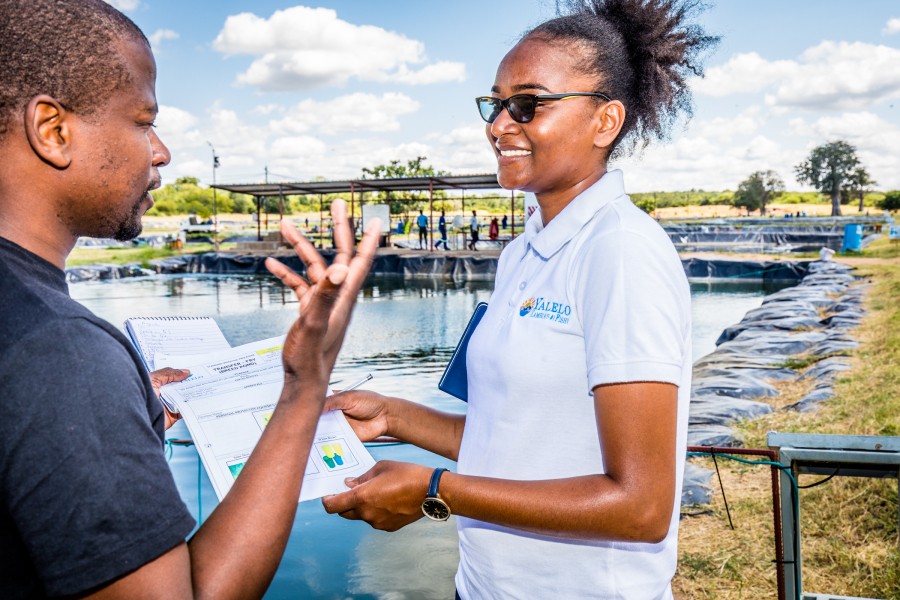


Budding business opportunities in developing countries face a wide range of barriers limiting their growth. FMO wants to change this by using market creation to address the most pressing hurdles and make these projects and businesses 'bankable'.
There is a large financing gap towards achieving the Sustainable Development Goals (SDGs), and simultaneously not enough business opportunities for Development Finance Institutions (DFIs) and other impact investors to invest in.
Development banks would like to invest more in promising projects and enterprises but face limitations on the type of investments they can make. Typically, companies need to be of a certain size, meet ESG standards, and demonstrate a successful track record. By zooming in and addressing the hurdles to ‘bankability’, market creation can unlock many impactful, bankable investment opportunities.

Market creation is a pivotal ambition in our 2030 Pioneer, Develop, Scale strategy. It aims to generate more investment opportunities for development banks and other large-impact investors seeking to contribute to private sector development in the markets and sectors that it currently cannot reach.
With market creation, we are leveraging our investment skills, expertise and partnerships to tackle investment barriers. Our goal is to increase the success rate for early-stage companies and broaden the pipeline of inclusive, impactful, and sustainable transactions.
Market creation is a new flywheel to our investment approach. Yet, at the same time, we have already been applying it in many of our public fund mandates.
Since 2006, FMO has managed public blended fund mandates that seek to make higher-risk markets and sectors investable by blazing the trail. Recent examples are Mobilising Finance for Forests (MFF), a blended finance investment program established together with the UK government to create bankable forestry projects, and DFCD, a pioneering consortium led by FMO, along with two investment managers and two international NGOs to make promising climate-adaptation projects investment ready for DFCD’s investment facilities.
We also initiated market creation activities through programs such as ARIA and Invest for Impact Nepal. ARIA, a joint initiative with BII, aims to address systemic barriers in frontier markets in Africa. Invest for Impact Nepal, established by BII, SDC, and ourselves, focuses on ecosystem constraints supporting local financial institutions and private equity funds.
Investment barriers are complex and require partnerships of complementary organizations to design the various needed solutions in a value chain or entrepreneurial ecosystem. We want to team up with donors, specialized NGOs in private sector development, and financial intermediaries to move the needle for the next generation of entrepreneurs.
To tackle the roots and not the symptoms, we will develop together with our partners interventions across the spectrum of Ecosystem Building and Business Development.
Ecosystem Building | focuses on initiatives that address fundamental market shortcomings that take much more time – five to ten years – to resolve. The objective is to help foster a supportive environment for (new) businesses to thrive. This includes promoting transparent regulations that facilitate business or supporting initiatives that improve business support services or the capacity of local fund managers and financial intermediaries.
Business Development | will target investment bottlenecks within companies that withhold development banks such as FMO from investing. We analyze the barriers in-depth to also identify any hurdles beyond the more obvious issues around insufficient financial management, lacking ESG standards, and collateral.
We want to direct our efforts to the development challenges where the investment need is the highest and where the barriers are most systemic:
With the support of the Dutch government, FMO will start by developing (joint) programs for financial inclusion collaborating with Triple Jump. For country level initiatives, we have prioritized certain African countries, such as Ethiopia, the Democratic Republic of the Congo, Tanzania, Ghana and Nigeria.
Many of the activities on the ground are typically ‘small and many’ while FMO and other DFIs are more geared towards ‘larger and few.’ We will therefore work with program partners and local business development organizations, NGOs, business accelerators, and ecosystem builders to implement the activities.
Market creation is a long-term, collaborative approach aimed at developing markets in places that need it the most. By pooling resources, knowledge, and strengths, we can create synergies in developing standard operating procedures, reporting standards, and impact measurement.
That's why we are establishing a joint Market Creation platform to provide an avenue for funders to align and co-fund a platform that will co-create and implement through partnerships highly relevant market creation interventions leading to the emergence of a larger pipeline of bankable investment opportunties. These programs are designed and funded by different combinations of donors, investors, and implementers, depending on the specific barriers to be addressed. Whether it involves business development or ecosystem building, the approach will vary based on the country, theme and (sub-)sector.
As FMO, we are taking the initiative to design the Market Creation platform, but our ambition is to develop this with and for the development and impact finance sector, as well as the donor community at large. Because together, we can jointly help to shape and build the markets of tomorrow.